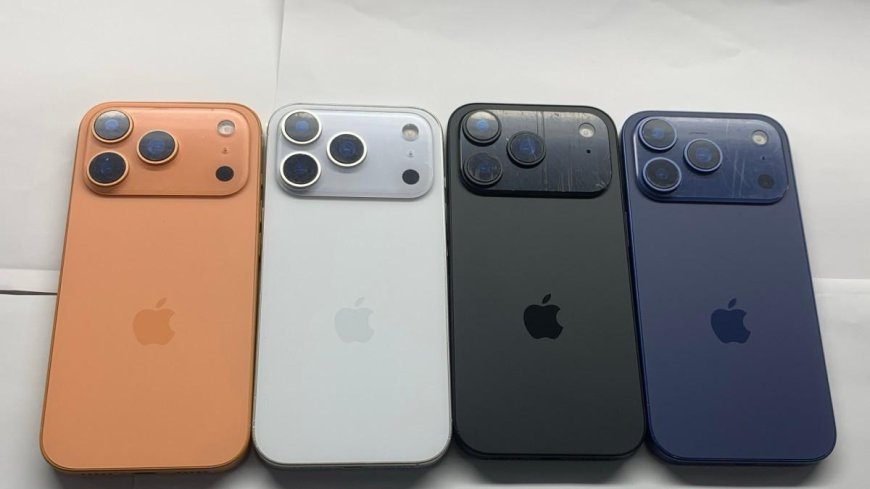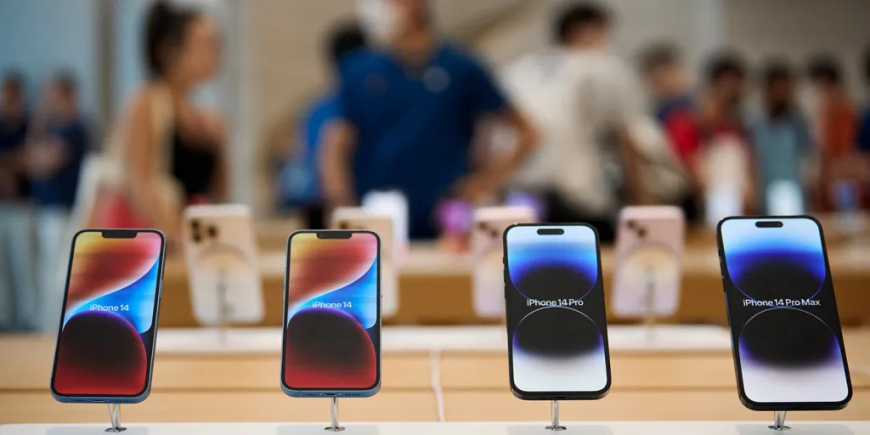8 Hidden Reasons Many Women Prefer iPhones Over Other Brands
While the iPhone’s association with prestige and luxury often dominates the conversation, there are deeper, lesser-known factors influencing this loyalty.

Any woman you've met in your life either has an iPhone or is dreaming of owning one. Despite Android smartphones overwhelmingly dominating Kenya’s mobile market — with Google’s Android system powering about 94.2 per cent of devices compared to iOS’s 5.8 per cent — a growing number of women in Kenya are gravitating toward Apple’s iPhone.
On Monday, October 13, Beatrice Njeri, a fruit vendor who is popular on X and TikTok, took to X to announce to her fans that she had gifted herself the latest flagship iPhone 17 Pro Max for her birthday.
"Yooh, I was manifesting the 16 pro max, but guess what! New owner in town. Hey, iPhone 17 Pro Max," she wrote under the moniker Irris Njeri. Further, she shared a receipt showing she coughed up Ksh248,000 to acquire the powerful gadget.
As the post of her showcasing her new gadget went viral on X, viewed close to 200,000 times and counting, some users bemoaned that she had purchased the gadget oblivious of the revolutionary features the expensive smartphone possesses.

Photo of iPhone 17 Pro Max devices. /TEKNOLOGI.ID
"This phone is capable of recording ProRes videos, play select Triple A games, and run LLM models locally, but this is gonna be its life," wrote Stanley Masinde, who was criticised merely for his technical take.
While the iPhone’s association with prestige and luxury often dominates the conversation, there are deeper, lesser-known factors influencing this loyalty. From resale value and design to privacy, safety, and ecosystem reliability,
Here’s why more women, Kenyan ones included, are choosing iPhones despite the steep price tag, and even though high-end Samsung phones possess features that are superior to iPhones:
1. Strong Resale Value and Trade-In Market
In Kenya, iPhones retain remarkable value long after purchase. Unlike many Android models that lose over half their worth within a year, iPhones can hold 50–70 per cent of their original price even after two to three years.
For example, some Nairobi retailers offer up to Ksh 110,000 for used iPhone 14 Pro Max units, depending on condition. This high resale value appeals to many women who plan purchases carefully or want flexibility when upgrading. It turns the iPhone from a one-off luxury into a manageable long-term investment.
2. Camera and Social Media Use
Kenyan women are among Africa’s most active social media users, with platforms like Instagram, TikTok, and WhatsApp driving photo and video sharing culture. Surveys show that women tend to take and post more selfies than men, making camera reliability a big deal.
The iPhone’s camera quality — especially its natural skin-tone rendering, portrait mode, and consistency — means users don’t have to spend time adjusting filters or lighting.
For content creators, influencers, and everyday users alike, the iPhone’s “it just works” approach produces social-ready photos and videos with minimal effort.
3. Brand Trust, Safety, and Support
With Kenya’s smartphone market flooded by parallel imports and counterfeit Android models, Apple’s reputation for authenticity and reliability gives iPhones an edge.
Women often cite trust and product safety as major deciding factors when choosing tech products. Buying an iPhone through authorized resellers like Salute iWorld or iStreet Kenya guarantees a verified warranty, reducing the risk of fakes or poor after-sales service.
For busy users who don’t have time to troubleshoot hardware or software issues, the iPhone’s consistency and official support network are major pluses.
4. Ecosystem and Integration
While Apple Pay and other advanced Apple services are not yet mainstream in Kenya, the iPhone still fits seamlessly into the broader Apple ecosystem. Features such as iCloud backup, AirDrop, FaceTime, and smooth connectivity across Apple devices simplify daily life for women balancing business, family, and social needs.
Kenyan professionals and entrepreneurs increasingly rely on digital tools and banking apps, and the iPhone’s reputation for stability, security, and compatibility with essential apps — including M-Pesa, mobile banking, and social commerce platforms — makes it a practical companion for multitaskers.
5. Identity, Signalling, and Social Dynamics
Let’s be honest: in Kenya, an iPhone still makes a statement. Whether it’s a corporate meeting in Upper Hill, a brunch in Westlands, or a TikTok Live session, pulling out an iPhone signals aspiration, taste, and reliability. But it’s more than showing off.
For many women, the iPhone represents success, confidence, and belonging to a modern, tech-savvy community. Data from recent brand perception studies lists Apple among the top 10 most-loved brands by Kenyan women, alongside household names like M-Pesa and Safaricom.
The iPhone has quietly evolved into a lifestyle badge — part of how women express identity and ambition in a digital world.
6. Financial Models and Affordability Options
The iPhone’s high cost — sometimes exceeding Ksh 160,000 for premium models — has long been a barrier. However, changing market trends are making ownership more accessible.
Nairobi retailers and fintech startups are increasingly offering refurbished iPhones and flexible financing options, including buy-now-pay-later (BNPL) programs. Clean, certified refurbished iPhones with short warranties are now common in markets like Kimathi Street and online stores.

Photo of iPhone devices on display at an Apple store. /GOOGLE
For women entrepreneurs or professionals who prefer to spread costs over several months, these payment models make the iPhone a more realistic goal than before.
7. Consistency in Software Updates and Longevity
Apple’s long-term software support is a major reason women prefer iPhones. Most models receive iOS updates for five to seven years — far longer than typical Android phones, which often stop receiving updates after two years. This ensures better performance, fewer security risks, and a more consistent user experience.
For Kenyan women who use their phones for business, mobile banking, and communication, this longevity means fewer disruptions and lower long-term costs. The iPhone also retains its performance better over time, reducing frustrations with lag, crashes, or outdated apps.
8. Safety and Security Features
Apple’s continued emphasis on privacy and safety resonates strongly with women, especially in an era of increasing online scams and data leaks.
Features like App Tracking Transparency, Face ID security, and end-to-end encryption on iMessage and FaceTime make the iPhone feel safer. The newer models even include Crash Detection and Emergency SOS, which can automatically alert emergency services — a small but meaningful safety net for women who travel or work alone.
In a society where personal safety and digital privacy are growing concerns, these tools add tangible peace of mind.
The Trade-offs Remain
Cost remains the biggest barrier; top-tier models can cost more than a used car or an acre of land. Android still dominates with affordable, feature-rich phones from brands like Tecno, Infinix, and Samsung that meet the needs of the average Kenyan user.
Access to authorized Apple service centers outside Nairobi and Mombasa is still limited, and import duties make devices more expensive than in the United States (US) or Europe.
However, Kenya’s growing digital middle class — led by young professionals, influencers, and entrepreneurs — continues to shift the market. For this demographic, the iPhone isn’t just a communication device. It’s an investment in stability, identity, and future-proof tech.
The Bigger Picture
Ultimately, women’s preference for iPhones blends practicality and aspiration. From dependable cameras and safety features to resale value and a trusted brand name, the iPhone appeals to those seeking reliability and self-expression in one sleek package.
As mobile commerce, digital creativity, and financial independence continue to expand among women, the iPhone’s blend of function and prestige keeps it a top choice — not just for what it does, but for what it represents.
In a market flooded with options, the iPhone remains the one smartphone that continues to spark conversation, loyalty, and quiet admiration — a symbol of modern womanhood in the digital age.







